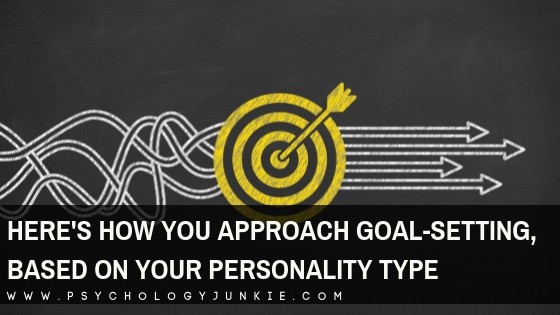Here’s How You Approach Your Goals, Based on Your Myers-Briggs® Personality Type
Have you ever wondered how you can get better at achieving the objectives you set out for yourself? Do you ever feel like if you had a different personality type it would be easier? Today we’re going to look at some of the strengths and weaknesses each Myers-Briggs® type experiences when they set goals and aim to achieve them. Let’s get started!
Not sure what your personality type is? Take our new personality questionnaire!

Goal-Setting Tips for Each Myers-Briggs® Personality Type
The Extraverted-Perceiving Personality Types (ENFPs, ENTPs, ESFPs, ESTPs)
How EPs Approach Goals:
- Explore all the alternatives out-loud first.
- Verbalize the possibilities.
- Redefine goals continually.
- Get intimidated and argumentative if they feel their options are being narrowed.
- Move towards goals in “bursts” of energy and inspiration.
- Work spontaneously, rather than methodically.
- Enjoy mixing work with play and have a high tolerance for interruptions.
Extraverted-Perceiving personality types (ENFPs, ENTPs, ESFPs, and ESTPs) tend to explore alternatives and possibilities for a great deal of time before they settle down and accomplish a singular objective.
Otto Kroeger, president of the Association of Psychological Type International, says of EP types, “Extraverted-Perceivers, no matter what the goal, want to argue about it for a while. Sometimes it can be very frustrating for subordinates in such situations to get a clear picture of exactly what the EP’s goals are. For EPs, goals can change overnight – or even midsentence – as they continue to refine things verbally and get feedback from others.”
EPs have an exploratory style and hate feeling tied down. If they are pushed towards one singular goal too quickly they feel confined and become rebellious. EPs like doing things that have never been done before and they greatly prize independence. Because of this, they tend to venture towards entrepreneurial objectives. They also like to get frequent changes-of-scenery throughout the process of achieving a goal. They want to get up and move around, stretch their legs, open a new tab on their internet browser, and so on. Variety inspires and stimulates them and sameness bores them.
ENPs enjoy theorizing about possibilities, hypothesizing about the future, and discussing novel enterprises. Goals that revolve around personal-growth, innovation, and stepping away from tradition appeal to ENPs.
ESPs enjoy a lot of action. They want to be up moving around and getting their hands on things. They enjoy a challenge or a gamble and have a high tolerance for risk. Concrete goals that require quick thinking and physical prowess tend to appeal to them.
Clara, an ENFP I spoke with, said that she gets excited about making goals and is constantly creating to-do lists and inspiration boards. However, she gets bored part-way through the process of completing a goal and finds herself fantasizing about alternatives and different projects that might be more exciting.
Marianne, an ESTP I spoke with, said that she can be very focused when she’s got a goal in mind, but it has to be something that appeals to her need for action. Goals that involve making new connections for her business, recreation and challenges that appeal to her competitive side are easy for her to achieve. Goals that require a lot of sedentary, nitty-gritty detail work tend to bore her.
ENFPs and ESFPs are more motivated to achieve their goals when there is a personal value that aligns with their objective. Are they animal lovers? Dog-walking 5x a week will probably help them stick with their exercise goals better than walking alone. EFPs are also more motivated to stick with their goals when they work as a team with other individuals. Having human companionship and encouragement keeps them focused and helps their tasks to feel less like a “chore.”
ENTPs and ESTPs are more motivated to achieve their goals when they are being challenged or are competing against others. Trying to lose 20 lbs? These types will be more motivated if they’re competing against their friends to see who can do the most sit-ups, push-ups, etc,.. ETPs are also concerned with the underlying logic of the goal they are working on. They will categorize the different facets of the goal, prioritize each part of the process, and work with precision.
The Introverted Perceiving Personality Types (INFPs, INTPS, ISFPs, ISTPs)
How IPs approach Goals:
- Collect information about possible goals
- Spend time alone sifting through the information
- Explore possibilities either alone or one-on-one with a trusted friend
- Need time to reflect after discussions about goals with others
- Are often inwardly resolute but outwardly appear flexible
- Tend to work well independently
Introverted-Perceiving personality types (ISFPs, INFPs, ISTPs, INTPs) tend to start goals with a very firm idea of what they want. From that stance of resolute-focus, they then look outwards for possibilities, alternatives, and other perspectives. You can imagine their thinking process like a diamond; starting with closure, moving out towards possibilities and alternatives, then back towards closure again.
For the IFP, the important thing is to live a meaningful, purposeful life without a lot of outside boundaries and restrictions. Their goals are for their joy and pleasure or for a value or cause that they hold dear. IPs are not typically motivated by external pressures and a lot of awards or accolades. Their goals are often driven by an inner vision that they may not even share with others. It’s very common for IPs to achieve a goal beneath-the-radar, only to surprise their friends and family members when they’ve accomplished something nobody realized they were aiming for.
INPs are conceptualizers and theorists, imagining all the possibilities and abstract relationships between things. INTPs and INFPs are very imaginative and enjoy adding to their goals through quiet periods of envisioning and foreseeing. They may call up a trusted friend and brainstorm ideas, alternatives, or ways they could continually improve on their projects and ideas. They will try to find new ways to achieve things rather than relying on traditional methods. The original idea might resemble the roots or stump of a tree, and then during the exploration process, the INPs will develop many branches of related possibilities and objectives.
“On a scale of 1-10 I’m about a 9 as far as amount of goals. I’m very goal-oriented but they tend to be abstract goals that are difficult to measure. I tend to meet my abstract goals (e.g. become more [trait]) and tend to fail at my practical goals, at least for the timing I believe it will take.” – @mbti_insights, INTP Twitter User
ISPs move from a firm decision or viewpoint to exploring ways to physically improve upon their idea. What details could improve their project or goal? What additions or alternatives could make it really stand out? For example, if an ISTP has a goal to design a backpack, they might think about how they could create specialized pockets for iPhones and tablets. If an ISFP wants to lose 20 lbs, they might think about how they should focus on waist measurements more than pounds and look up the best ways to whittle away at the waist.
ISFPs and INFPs are more motivated to achieve their goals when they align with their personal values. Both types are highly creative and purposeful and will usually put a lot of themselves and their passion into whatever they do. They often struggle with breaking large goals down into achievable steps. Many IFPs have said that STJs help them to break down large projects and streamline them into a more manageable process.
ISTPs and INTPs are motivated by curiosity and competition. They want to understand how things work and explore the underlying principles of how things are connected. If they aren’t curious about something they are rarely interested in pursuing it. ISTPs thrive on challenging situations and enjoy taking life as it comes. They usually are jacks-of-all-trades with a knack for solving problems in the moment. INTPs are interested in theorizing, analyzing, and learning. Their goals will often pertain to gathering knowledge, exploring new ideas, or innovating something. The ISTP’s goals are often more concrete whereas the INTP’s goals tend to be more conceptual.
The Extraverted Judging Personality Types (ENFJs, ENTJs, ESFJs, ESTJs)
How EJs Approach Goals:
- Enjoy discussing their ideas and goals out-loud with others.
- Come to firm decisions quickly.
- Usually have a singular focus.
- Appreciate goals that are measurable.
- Work in a methodical fashion.
- Enjoy being part of a team.
Extraverted-Judging personality types (ENFJs, ESFJs, ENTJs, ESTJs) tend to determine early on in their life what their goals should be. They tend to live intentionally and methodically, and they have a strong focus on time. These are the types that are more likely to get impatient and worked up over deadlines because they are so conscious of them and so determined to accomplish things ahead of schedule.
EJs can be very hard on themselves when they fail to achieve their objectives in a timely manner. While they tend to be productive and methodical, they can also run the risk of being pushy to the people around them. If they believe a goal is in the best interest of “the group” they may have very little tolerance for people who aren’t fully on-board. They may assume that others are also interested in achieving an objective when those same people haven’t actually voiced their approval. That said, they are also great motivators and can be a unifying force in getting a team to work efficiently (ETJs) or harmoniously (EFJs).
ESJs focus on structure, order, and getting goals achieved in a sequential set of steps. They are usually good at the logistics-side of goal-achievement. ESFJs tend to know where to put people and the roles that will meet their needs most fully. ESTJs tend to know which processes are inefficient or which are slowing people down. Both of these types tend to be responsible and methodical, working step-by-step until an objective is attained. Both can also run the risk of getting caught up in the details or a project and losing sight of the overall big picture.
ENJs focus on the long-term impacts of whatever goals they are trying to achieve. They tend to think ten-steps ahead of wherever they are in the present moment. Looking to the future, they envision where they want to be and then backtrack to figure out how to get there. It’s natural for them to be insightful, progressive, and determined. At the same time, they can get tripped up because they’re so focused on the big picture that they lose sight of details that are important but they see as “insignificant.”
ENTJs and ESTJs plan out their objectives well in advance and organize everything they can to achieve those objectives as quickly as possible. They are motivated by making decisions, checking items off a list, and having closure. Highly decisive, they can’t stand procrastination or distractions and will usually have a schedule they follow to make sure everything is moving at a quick pace. They are skilled at breaking down large projects into bite-sized steps and they will pay attention to anything that is illogical, inefficient, or ineffective.
EFJs and ENFJs also plan out their objectives well in advance but are more open to modifications and compromise if the needs of people call for an adjustment. Most importantly to EFJs is that unity and group cohesion is maintained. They are motivated by seeing people happy and being able to get closure. They may get so caught up in caring for other people that their individual goals are put on the back-burner indefinitely. This tends to frustrate them a lot! Both types have a knack for getting people to cooperate and work together. ESFJs are skilled in organizing people logistically and noticing things like health, well-being, and stability or lack thereof. ENFJs are skilled at diplomacy, making sure everyone feels heard and foreseeing implications. They tend to have idealistic, long-range visions that they aim for.
The Introverted Judging Personality Types (INFJs, INTJs, ISFJs, ISTJs)
How IJs Approach Goals:
- Collect information about possible goals.
- Spend time alone assimilating information and reflecting on it.
- Look outside to organize goals/create timelines/plan.
- May appear outwardly very decisive while they are inwardly still open to new alternatives and modifications.
- Need time to think and reflect after discussing goals with others.
- Can be more competitive than they seem at first glance.
Introverted judging personality types (INFJs, ISFJs, INTJs, ISTJs) like lots of time alone to map-out where they are going and how they will get there. Being pressured into a goal or objective before they’ve had time to independently analyze it will cause them to be stressed and irritable. All four of these types tend to enjoy to-do lists, planners, and outlines that they can use to get their inner strategy mapped out in an external way.
IJs may seem more firm in their decisions than they actually are. They start their decision-making process from a phase of openness. They explore alternatives and perspectives, narrowing their options down to one best-fit goal. However, what others might see is only the decision they’ve made without realizing how much thought they’ve put into the decision first. These types can procrastinate quite a bit until they’ve got a very clear plan or direction forward.
INJs are forward-thinking and visionary in their goals. They tend to leap into the distant future with their goals, envisioning a possibility or scenario that is abstract and distant. From that vision, they backtrack to try to create the road-map they will use to achieve that vision. These types are insightful, imaginative, creative, and inventive. However, in their enthusiasm and visionary focus, they can lose sight of details and practical concerns. This can cause them to forget important meetings, overlook minor flaws, and push towards their vision at the expense of day-to-day concerns.
“I’m constantly thinking about my goals. Long term, short term, conceptual/big picture, s.m.a.r.t., mostly individual, some relational. Constantly thinking about growth & what’s next. Intentionality is important to me.” – Anna Reel, INFJ Personal Life Coach and founder of thereelanna.com
ISJs are meticulous and pragmatic in pursuit of their goals. They focus on the series of steps needed to achieve a goal and look out for details that might trip them up. They have a gift for creating contingency plans and using data from past experience to improve the odds of the objective being reached. Their persevering, down-to-earth nature serves them well and instills a sense of confidence in the people they guide. However, in their reliance on tried-and-true methods, they can dismiss new alternatives that might improve their ability to achieve goals. They might also get caught up in the details and be unsure how to move forward until every detail is absolutely perfect.
INTJs and ISTJs prize efficiency and structure. They are skilled at breaking down large objectives into manageable steps. They’re also good at spotting loopholes in a system and fixing ineffective operating procedures. Organizing people, creating rules, segmenting tasks, these are all things that they excel at. ISTJs tend to have strong skills in logistics and organizing a project to meet a deadline at the best time. INTJs tend to have strong strategic skills, envisioning a goal and working out the exact pathway they will take to get there. Both types can excel in both of these areas, however.
INFJs and ISFJs prize harmony and inter-personal connection. They are skilled at unifying groups of people and catalyzing them towards a future goal. They help people to understand WHY they would want to reach a goal. These types are more motivated to achieve a goal if it will have some personal impact on them or a cause they care about. A lot of their goals have a humanitarian focus. INFJs tend to create more abstract goals (personal growth/spirituality/long-range/conceptual) whereas ISFJs tend to have more concrete, specific, immediate goals (staying healthy/rescuing a certain amount of homeless puppies/achieving a high-grade in their classes).
Read These Next:
Here’s What Makes You Dangerous, Based on Your Myers-Briggs® Personality Type
Here’s What Freedom Means to You, Based on Your Myers-Briggs® Personality Type
What Are Your Thoughts?
Do you agree with this article? Disagree? Let us know how you achieve your goals in the comments!
Find out more about your personality type in our eBooks, Discovering You: Unlocking the Power of Personality Type, The INFJ – Understanding the Mystic, and The INFP – Understanding the Dreamer. You can also connect with me via Facebook, Instagram, or Twitter!
Subscribe to Our Newsletter

Want to discover more about personality type? Get the inside scoop with Susan Storm on all things typological, along with special subscriber freebies, and discounts on new eBooks and courses! Join our newsletter today!















I absolutely love these insights. I am an ENFJ/P they describe me to a tee and have helped me accept myself!! I read one to a friend, she was so impressed and said how can they know that about you? It’s so you!
I love reading them, they are life giving. Thank you!!
I agree with this, I am INFJ and I know my weakness is over thinking (what will happen in the future) that gives me literally sleepless nights. I also only get involved with events or causes that are abstract. Makes even more sense now why I am Sangoma (traditional healer)
As INTJ master chess player, I can elaborate. On move 20, a master may see a position 40 moves later if he picks a certain strategy. Strategy is based on deep understanding of strengths/weaknesses not on calculations. The fundamental idea is to restrict opponent’s counterplay and slowly accumulate decisive advantage with low probability of a simple mistake. But! This strategy only works against amateurs not against professionals. In real life, several “games” are played at the same time. Even if ignorance of exact details and minor moves may be OK in some games, it will definitely not be OK in all games. One choice may be to remain on amateur level, have relatively easy time in “tournaments” and enjoy life outside of “tournaments”.
This was great! It made me feel that I wasn’t terrible in the traditional goals of ambition in the 9 to 5, which I’ve always done. Not only that, but I earn under the mean income, and feel so inadequate, even though I know I’m so conscientious. But when I have personal goals, like making picture books for individual family members, I can go on forever until it looks perfect, and they always love it, because it’s all about THEM. I get so much pleasure from that. Also, I love dogs but can’t have one right now, so for 10 years I pet-sat and dog-walked to get my dog and cat fixes. I’m too tired to do it anymore, except for family who have dogs.